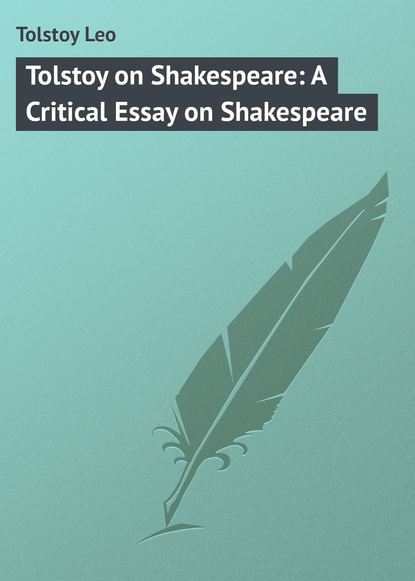По всем вопросам обращайтесь на: info@litportal.ru
(©) 2003-2025.
✖
Tolstoy on Shakespeare: A Critical Essay on Shakespeare
Настройки чтения
Размер шрифта
Высота строк
Поля
The crowd wishes to kill the clerk of Chatham because he can read, write, and cast accounts. (Cade. "O monstrous!") Sir Humphrey Stafford calls them
"Rebellious hinds, the filth and scum of Kent,
Marked for the gallows."
(Ib.)
Clifford succeeds without much difficulty in turning the enmity of the mob against France, and Cade ejaculates disconsolately, "Was ever a feather so lightly blown to and fro as this multitude?" (Ib., Act 4, Sc. 8.) In the stage directions of this scene, Shakespeare shows his own opinion of the mob by writing, "Enter Cade and his rabblement." One looks in vain here as in the Roman plays for a suggestion that poor people sometimes suffer wrongfully from hunger and want, that they occasionally have just grievances, and that their efforts to present them, so far from being ludicrous, are the most serious parts of history, beside which the struttings of kings and courtiers sink into insignificance.
One of the popular songs in Tyler's rebellion was the familiar couplet:
"When Adam delved and Eve span,
Who was then the gentleman?"
Shakespeare refers to it in "Hamlet," where the grave-diggers speak as follows:
"First Clown. Come, my spade. There is no ancient gentleman but gardners, ditchers and grave-makers; they hold up Adam's profession.
Second Clown. Was he a gentleman?
First Clown. He was the first that ever bore arms.
Second Clown. Why, he had none.
First Clown. What, art a heathen? How dost thou understand the Scripture? The Scripture says, Adam digged; could he dig without arms?"
(Act 5, Sc. 1.)
That Shakespeare's caricature of Tyler's rebellion is a fair indication of his view of all popular risings appears from the remarks addressed by Westmoreland to the Archbishop of York in the Second Part of "Henry IV." (Act 4, Sc. 1). Says he:
"If that rebellion
Came like itself, in base and abject routs,
Led on by bloody youth, guarded with rags,
And countenanced by boys and beggary;
I say if damned commotion so appeared,
In his true, native, and most proper shape,
You, Reverend Father, and these noble lords
Had not been here to dress the ugly form
Of base and bloody insurrection
With your fair honors."
The first and last of Shakespeare's English historical plays, "King John" and "Henry VIII.," lie beyond the limits of the civil wars, and each of them treats of a period momentous in the annals of English liberty, a fact which Shakespeare absolutely ignores. John as king had two great misfortunes – he suffered disgrace at the hands of his barons and of the pope. The first event, the wringing of Magna Charta from the king, Shakespeare passes over. A sense of national pride might have excused the omission of the latter humiliation, but no, it was a triumph of authority, and as such Shakespeare must record it for the edification of his hearers, and consequently we have the king presented on the stage as meekly receiving the crown from the papal legate (Act 5, Sc. 1). England was freed from the Roman yoke in the reign of Henry VIII., and in the drama of that name Shakespeare might have balanced the indignity forced upon King John, but now he is silent. Nothing must be said against authority, even against that of the pope, and the play culminates in the pomp and parade of the christening of the infant Elizabeth! Such is Shakespeare's conception of history! Who could guess from reading these English historical plays that throughout the period which they cover English freedom was growing, that justice and the rights of man were asserting themselves, while despotism was gradually curbed and limited? This is the one great glory of English history, exhibiting itself at Runnymede, reflected in Wyclif and John Ball and Wat Tyler, and shining dimly in the birth of a national church under the eighth Henry. As Shakespeare wrote, it was preparing for a new and conspicuous outburst. When he died, Oliver Cromwell was already seventeen years of age and John Hampden twenty-two. The spirit of Hampden was preeminently the English spirit – the spirit which has given distinction to the Anglo-Saxon race – and he and Shakespeare were contemporaries, and yet of this spirit not a vestige is to be found in the English historical plays and no opportunities lost to obliterate or distort its manifestations. Only in Brutus and his fellow-conspirators – of all Shakespearian characters – do we find the least consideration for liberty, and even then he makes the common, and perhaps in his time the unavoidable, mistake of overlooking the genuinely democratic leanings of Julius Cæsar and the anti-popular character of the successful plot against him.
It has in all ages been a pastime of noble minds to try to depict a perfect state of society. Forty years before Shakespeare's birth, Sir Thomas More published his "Utopia" to the world. Bacon intended to do the same thing in the "New Atlantis," but never completed the work, while Sir Philip Sidney gives us his dream in his "Arcadia." Montaigne makes a similar essay, and we quote from Florio's translation, published in 1603, the following passage (Montaigne's "Essays," Book I, Chapter 30):
"It is a nation, would I answer Plato, that hath no kind of traffic, no knowledge of letters, no intelligence of numbers, no name of magistrate nor of political superiority; no use of service, of riches, or of poverty; no contracts, no succession, no dividences; no occupation, but idle; no respect of kindred, but common; no apparel, but natural; no manuring of lands; no use of wine, corn, or metal. The very words that import lying, falsehood, treason, dissimulation, covetousness, envy, detraction, and pardon were never heard among them."
We may readily infer that Shakespeare found little to sympathize with in this somewhat extravagant outline of a happy nation, but he goes out of his way to travesty it. In "The Tempest" he makes Gonzalo, the noblest character in the play, hold the following language to the inevitable king (Shakespeare can not imagine even a desert island without a king!):
"Had I plantation of this isle, my lord,
I' th' commonwealth I would by contraries
Execute all things; for no kind of traffic
Would I admit; no name of magistrate;
Letters should not be known; riches, poverty,
And use of service, none; contract, succession,
Bourn, bound of land, tilth, vineyard, none;
No use of metal, corn or wine or oil;
No occupation; all men idle, – all,
And women too, but innocent and pure;
No sovereignty, …
Sebastian. Yet he would be king on't.
Antonia. The latter end of his commonwealth forgets
the beginning.
Gonzalo. All things in common. Nature should produce
Without sweat or endeavor; treason, felony,
Sword, pike, knife, gun, or need of any engine,
Would I not have; but Nature should bring forth
Of its own kind, all foison, all abundance,
To feed my innocent people.
Seb. No marrying 'mong his subjects?
Ant. None, man; all idle, whores, and knaves.
Gon. I would with such perfection govern, sir,
To 'xcel the golden age.
Seb. 'Save his Majesty!
Ant. Long live Gonzalo!
Gon. And do you mark me, sir?
King. Pr'ythee, no more; thou dost talk nothing to me.
Gon. I do well believe your Highness; and did it to
minister occasion to these gentlemen, who are of such
sensible and nimble lungs that they always use to laugh
at nothing.
Ant. 'Twas you we laughed at.
Gon. Who, in this kind of merry fooling, am nothing
to you; so you may continue and laugh at nothing still."
(Tempest, Act 2, Sc. 1.)
That all things are not for the best in the best of all possible worlds would seem to result from the wise remarks made by the fishermen who enliven the scene in "Pericles, Prince of Tyre." They compare landlords to whales who swallow up everything, and suggest that the land be purged of "these drones that rob the bee of her honey"; and Pericles, so far from being shocked at such revolutionary and vulgar sentiments, is impressed by their weight, and speaks kindly of the humble philosophers, who in their turn are hospitable to the shipwrecked prince – all of which un-Shakespearian matter adds doubt to the authenticity of this drama (Act 2, Sc. 1).
"Rebellious hinds, the filth and scum of Kent,
Marked for the gallows."
(Ib.)
Clifford succeeds without much difficulty in turning the enmity of the mob against France, and Cade ejaculates disconsolately, "Was ever a feather so lightly blown to and fro as this multitude?" (Ib., Act 4, Sc. 8.) In the stage directions of this scene, Shakespeare shows his own opinion of the mob by writing, "Enter Cade and his rabblement." One looks in vain here as in the Roman plays for a suggestion that poor people sometimes suffer wrongfully from hunger and want, that they occasionally have just grievances, and that their efforts to present them, so far from being ludicrous, are the most serious parts of history, beside which the struttings of kings and courtiers sink into insignificance.
One of the popular songs in Tyler's rebellion was the familiar couplet:
"When Adam delved and Eve span,
Who was then the gentleman?"
Shakespeare refers to it in "Hamlet," where the grave-diggers speak as follows:
"First Clown. Come, my spade. There is no ancient gentleman but gardners, ditchers and grave-makers; they hold up Adam's profession.
Second Clown. Was he a gentleman?
First Clown. He was the first that ever bore arms.
Second Clown. Why, he had none.
First Clown. What, art a heathen? How dost thou understand the Scripture? The Scripture says, Adam digged; could he dig without arms?"
(Act 5, Sc. 1.)
That Shakespeare's caricature of Tyler's rebellion is a fair indication of his view of all popular risings appears from the remarks addressed by Westmoreland to the Archbishop of York in the Second Part of "Henry IV." (Act 4, Sc. 1). Says he:
"If that rebellion
Came like itself, in base and abject routs,
Led on by bloody youth, guarded with rags,
And countenanced by boys and beggary;
I say if damned commotion so appeared,
In his true, native, and most proper shape,
You, Reverend Father, and these noble lords
Had not been here to dress the ugly form
Of base and bloody insurrection
With your fair honors."
The first and last of Shakespeare's English historical plays, "King John" and "Henry VIII.," lie beyond the limits of the civil wars, and each of them treats of a period momentous in the annals of English liberty, a fact which Shakespeare absolutely ignores. John as king had two great misfortunes – he suffered disgrace at the hands of his barons and of the pope. The first event, the wringing of Magna Charta from the king, Shakespeare passes over. A sense of national pride might have excused the omission of the latter humiliation, but no, it was a triumph of authority, and as such Shakespeare must record it for the edification of his hearers, and consequently we have the king presented on the stage as meekly receiving the crown from the papal legate (Act 5, Sc. 1). England was freed from the Roman yoke in the reign of Henry VIII., and in the drama of that name Shakespeare might have balanced the indignity forced upon King John, but now he is silent. Nothing must be said against authority, even against that of the pope, and the play culminates in the pomp and parade of the christening of the infant Elizabeth! Such is Shakespeare's conception of history! Who could guess from reading these English historical plays that throughout the period which they cover English freedom was growing, that justice and the rights of man were asserting themselves, while despotism was gradually curbed and limited? This is the one great glory of English history, exhibiting itself at Runnymede, reflected in Wyclif and John Ball and Wat Tyler, and shining dimly in the birth of a national church under the eighth Henry. As Shakespeare wrote, it was preparing for a new and conspicuous outburst. When he died, Oliver Cromwell was already seventeen years of age and John Hampden twenty-two. The spirit of Hampden was preeminently the English spirit – the spirit which has given distinction to the Anglo-Saxon race – and he and Shakespeare were contemporaries, and yet of this spirit not a vestige is to be found in the English historical plays and no opportunities lost to obliterate or distort its manifestations. Only in Brutus and his fellow-conspirators – of all Shakespearian characters – do we find the least consideration for liberty, and even then he makes the common, and perhaps in his time the unavoidable, mistake of overlooking the genuinely democratic leanings of Julius Cæsar and the anti-popular character of the successful plot against him.
It has in all ages been a pastime of noble minds to try to depict a perfect state of society. Forty years before Shakespeare's birth, Sir Thomas More published his "Utopia" to the world. Bacon intended to do the same thing in the "New Atlantis," but never completed the work, while Sir Philip Sidney gives us his dream in his "Arcadia." Montaigne makes a similar essay, and we quote from Florio's translation, published in 1603, the following passage (Montaigne's "Essays," Book I, Chapter 30):
"It is a nation, would I answer Plato, that hath no kind of traffic, no knowledge of letters, no intelligence of numbers, no name of magistrate nor of political superiority; no use of service, of riches, or of poverty; no contracts, no succession, no dividences; no occupation, but idle; no respect of kindred, but common; no apparel, but natural; no manuring of lands; no use of wine, corn, or metal. The very words that import lying, falsehood, treason, dissimulation, covetousness, envy, detraction, and pardon were never heard among them."
We may readily infer that Shakespeare found little to sympathize with in this somewhat extravagant outline of a happy nation, but he goes out of his way to travesty it. In "The Tempest" he makes Gonzalo, the noblest character in the play, hold the following language to the inevitable king (Shakespeare can not imagine even a desert island without a king!):
"Had I plantation of this isle, my lord,
I' th' commonwealth I would by contraries
Execute all things; for no kind of traffic
Would I admit; no name of magistrate;
Letters should not be known; riches, poverty,
And use of service, none; contract, succession,
Bourn, bound of land, tilth, vineyard, none;
No use of metal, corn or wine or oil;
No occupation; all men idle, – all,
And women too, but innocent and pure;
No sovereignty, …
Sebastian. Yet he would be king on't.
Antonia. The latter end of his commonwealth forgets
the beginning.
Gonzalo. All things in common. Nature should produce
Without sweat or endeavor; treason, felony,
Sword, pike, knife, gun, or need of any engine,
Would I not have; but Nature should bring forth
Of its own kind, all foison, all abundance,
To feed my innocent people.
Seb. No marrying 'mong his subjects?
Ant. None, man; all idle, whores, and knaves.
Gon. I would with such perfection govern, sir,
To 'xcel the golden age.
Seb. 'Save his Majesty!
Ant. Long live Gonzalo!
Gon. And do you mark me, sir?
King. Pr'ythee, no more; thou dost talk nothing to me.
Gon. I do well believe your Highness; and did it to
minister occasion to these gentlemen, who are of such
sensible and nimble lungs that they always use to laugh
at nothing.
Ant. 'Twas you we laughed at.
Gon. Who, in this kind of merry fooling, am nothing
to you; so you may continue and laugh at nothing still."
(Tempest, Act 2, Sc. 1.)
That all things are not for the best in the best of all possible worlds would seem to result from the wise remarks made by the fishermen who enliven the scene in "Pericles, Prince of Tyre." They compare landlords to whales who swallow up everything, and suggest that the land be purged of "these drones that rob the bee of her honey"; and Pericles, so far from being shocked at such revolutionary and vulgar sentiments, is impressed by their weight, and speaks kindly of the humble philosophers, who in their turn are hospitable to the shipwrecked prince – all of which un-Shakespearian matter adds doubt to the authenticity of this drama (Act 2, Sc. 1).

















